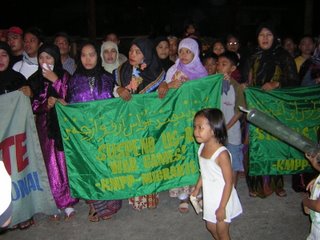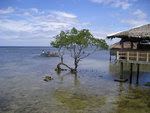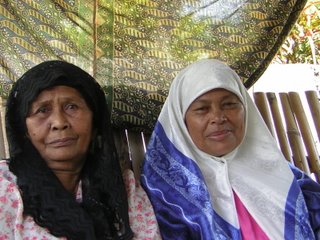
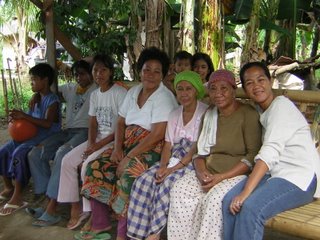
This are excerpts of my so called "report from the Philippines" during my Fulbright Fellowship. Since I did not create a blog at that time, I will be posting some of the interviews and my thoughts during my trip. I hope to create a blog for my trip to Malaysia this January to August 2007.
October, 2004:
I do not have an internet access at home due to the long process of applying for a landline at home outside Metro Manila area. Therefore, excuse my sporadic emails.
I finally adjusted to living in the Philippines though I am originally from here. The twenty-four years of living in the U.S. made me a stranger in my native land. It seems like I do not belong here nor I belong in the U.S. Strange feeling in living between two worlds and the hyphen between Filipino-American unites me with other immigrants.
But, there are a lot of Western influence that I do not feel I have left the U.S. especially in certain areas in Manila and Quezon City. Huge malls are ever-present and have everything that you can imagine, from fake Louis Vuitton, Prada, Coach bags to local handicrafts. In my province, Pampanga, former farm lands was converted to a mall that pushed farmers and their family out. So, every time that I have to go that mall to use the internet, I feel guilty!!!! Starbucks are also everywhere but they have Filipinos pastries. Okay, don’t make me feel guilty in buying coffee from Starbucks. Filipinos drink Nescafe instead of native coffee. However, there are cool areas in Quezon City. Quezon City is basically where all the NGOs are located and it is practically my hang-out place.
And most importantly, I have met so many good people. I have so much respect for the activists here in the Philippines. I met community organizers from SAMAKANA and MIGRANTE. They are not only paid so little but they also risks their lives. Community organizers from Bayan Muna and GABRIELA were murdered. A community organizer of MIGRANTE, who is a good friend of mine, was abducted near their office and gang raped by soldiers when she was seven months pregnant two years ago. These men and women have so much dedication that they humble me and give me inspiration.
Regarding my research, I am making headway. I am working with the MIGRANTE’s community organizer of the Muslim community in Culiat, Quezon City. The majority of the members of the community of Salaam Compound are Muslim women who are waiting to leave the Philippines to work abroad usually as domestic workers in the Middle East. The majority of these women are from the Maguindanao tribe. The Maguindanaos who live in the Cotabato, Maguindanao and Sultan Kudarat areas, are heavily affected by the continuing war against Muslim extremists in Mindanao. The Muslim separatist organization, Moro Islamic Liberation Front (MILF) or MI, were based in the area. Hashim Salamat, the founder and the leader of MI, was a Maguindanao. During the Estrada administration, he destroyed two major MI military compound in the area. The war is the major pushing factor for migration for Muslims.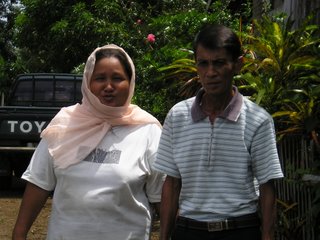
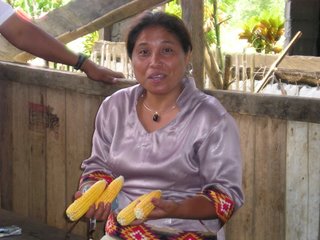
In addition to Culiat, I visited Lanao del Norte and Lanao del Sur in Mindanao to work with MOVIMONDO, an Italian relief agency working in war affected areas. My research corresponds with their future grant proposal to EU with GABRIELA and MIGRANTE to establish social protection for Muslim women migrants. I visited Kauswagan, Marawi City, and Tugaya to interview Muslim women who worked abroad. The area is so BEAUTIFUL though there are military checkpoints everywhere! The Maranao tribe lives in the area. What is interesting about my findings was the majority of Maranao women worked as nurses in the Middle East but specifically Saudi Arabia. The women from this tribe are very educated. Saudi Arabia was the popular destination because they all wanted to do Hajj. Also, their husbands accompany them abroad. The majority of their children were either born or educated in Saudi. But one woman I interviewed worked in Libya as a nurse. I have learned that the nickname of Moammar Qaddafi is “K.” Of all of the women I interviewed, she saved a lot of money because half of their salary was given in dollars and was directly deposited in the bank. Also, medicine and education was free so she did not have a lot of expenses. She stated that Filipinos were treated with a lot of respect and have not heard of any abuses. Also, Libyans do not hire domestic workers.
I also discussed my research with Muslim scholars who are teaching at the Mindanao State University (MSU) in the Islamic City of Marawi (Marawe). They were very open and gave me lots of information and suggestions!!!!
The campus of MSU is on top of the mountain overlooking Lanao Lake and the Sleeping Lady Mountain. The air is cool and unpolluted compared to Manila. I also had the privileged in swimming at Lanao Lake.

November 19, 2004:
Ramadan is finally over but I have to make up so many days because I traveled too much. For your information, when one travels during Ramadan he/she is excused from fasting but need to make it up. So, though Ramadan is technically over, I will be fasting once a week when I am not traveling to Manila/Quezon City and other places.
Asmara and I went to Zamboanga City for the last week of Ramadan. I only interviewed one woman. My trip to Zamboanga City was more for religious reasons. We attended taraweeh prayers every night at the mosque across from my friends’ home. Asmara finally heard the “adhan” (call for prayers) five times a day, very loud, and at different times (there are several mosques in the area, and they all did the adhan at 1-10 minutes apart for the same prayer times, I am not kidding!!). When she first heard it, she asked me what it was and I explained it to her and she sat down and listened to it. But later on that day, she started singing it and she added this line “pig is haram (not allowed), chicken is halal (allowed).” She had fun playing with the friends’ kids and the whole neighborhood. They practiced their English while they taught her Tagalog, Chavacano, Tausug, Maranao, and Maguindanao. By the way, the children in Zamboanga City know several languages because of the different ethno-linguistic groups in the area. There are several barter trades in Zamboanga selling batik fabrics from Indonesia and Malaysia. I also visited a Yakan weaving village where they sold beautiful tubao (head scarves), pillow cases, bags, wallets, wall hangings, and etc.
Ah, by the way, Zamboanga City is the headquarters of South Com, the Philippines army’s southern command post. The majority of the passengers of the plane we took to Zamboanga were soldiers. The city has a heavy military presence but not only Filipino but also Americans. The U.S. military provides training to the Philippine military in fighting Communism and Muslim “terrorism” in the area. There is a possibility that a U.S. military base will be established either in Basilan or in Turtle Islands (closer to Sabah, Malaysia). In the past, Subic Naval Base and Clark Air Force Base in Luzon symbolized the U.S. military presence in Southeast Asia during the Cold War. The creation of a U.S. military base in the area is crucial to the Bush’s administration fight against “terrorism.” Two major Muslim countries, Indonesia and Malaysia, are neighbors of the Philippines (the only Christian majority country in SE Asia). And of course, if there is a militarization, prostitution becomes an issue. There are five cases of abandoned children of American soldiers and Filipina women in the area.
Also, during my stay in Zamboanga City, I learned of the plight of the Filipinos deported by the Malaysian government from Sabah. I visited the Crisis Intervention Unit (CIU) of the Zamboanga City’s Department of Social Work. They were preparing for the arrival of 300 deportees from Sabah. The CIU employs eight social workers to deal with the needs of 300 deportees. They told me that they basically work 24/7. For some reason, the deportees reminded me of the undocumented but specifically Mexicans/Central Americans in the U.S. Instead of crossing the Rio Grande and the desert, the undocumented Filipinos cross the Sulu Sea via speed boat. The treatment of the undocumented Filipinos is similar to the treatment of the undocumented Mexicans/Central Americans. (Ah, another potential research for me. UPDATE: and I will be doing a research on this issue from January to August, 2007!)
Sabah, historically, is owned by the Sultan of Sulu and technically part of the Philippines, but leased to Malaysia by the Sultan. During the Marcos regime and the height of the civil war in Mindanao, Sabah provided refuge to the mujahideen and other Filipino Muslims affected by the war. Today is a different story…..
I was invited by the U.S. ambassador to the Philippines for an Iftar (breaking of the fast) dinner at his home before I left for Zamboanga City. It was interesting to see all the Muslim Filipinos who were from the upper crust. I sat next to a Tibetan man whose wife works for USAid, and he asked me if “Muslim Filipinos are hopeful about the future.” Well, if you ask the ones who are here, yes, they are hopeful but the ones who live in the midst of war and poverty, they will have a different answer. Overall, it was an interesting dinner…..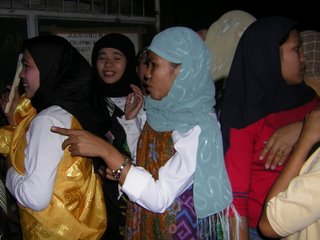
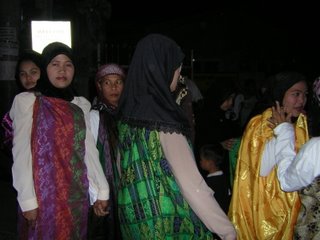
When I came back from
Zamboanga City, I attended the “Malong Parade against U.S. Aggressions in
Iraq” in Culiat,
Quezon City.
It is a beautiful sight to see Muslim sisters in their scarves and colorful malong screaming “Allahu Akbar.”
The majority of the women who participated are on their way to the
Middle East to work as domestic helpers.
Ah, before I forget, the military exercises of the U.S. and Philippine military are being held in the province of Tarlac. Tarlac also is the location of Hacienda Luisita owned by the family of the former president, Corazon Aquino; and as of yesterday 14 workers/tenant farmers and their children were killed during a rally (that began on Monday). The Philippines military shot live bullets to the striking workers/tenant farmers when the Department of Labor called them to quell the rally/strike on Monday late afternoon. The workers came back the next day and until today to keep fighting. Feudalism still exists and will continue in the Philippines until a real land reform is implemented!!!
January 12, 2005:
After a three and half weeks stay in Davao City, I am exhausted in traveling. But the trip was very productive.
Davao City is a beautiful city. It’s right next to the sea and Mt. Apo, the highest mountain in the Philippines. Lots of fruits especially my favorite, durian. There were stalls of durian and pomelo stalls in downtown Davao City where you can eat as many durian you can possibly can and down it with a cold cold soda to neutralize your body heat from eating durian!
I traveled around the area and used Davao City as my base. Met a lot of Muslims from the Kalagan or Dabawenyo tribe --- original/indigenous inhabitants of the Davao provinces. I visited Muslim community of Siriwan, Bangkal, Tibungco, Ma-a, Wa-an, Mandog, and the supposedly terrorist haven of Davao – Madaom. I interviewed a lot of Kalagan women who migrated as domestic helpers to Middle East. I also spoke to Muslim leaders and scholars from Bangkal and Madaom. The majority stated that there is a rampant employment discrimination against Muslims in Davao. Muslim women and men who apply for jobs in the three malls in Davao City will not get a job if they state their religion as Islam in their employment application. In addition, the majority of Kalagan have non-Arabic/Muslim names e.g. Larry, Wilson, Michelle, Maricel, Nelson, for very obvious reasons.
Employment discrimination is also a problem in the Muslim community of Metro Manila area especially after 9/11. The civil rights of Muslims or the Lumads (indigenous populations) is not protected by the Philippines Constitution. I have noticed that there is no specific mobilization among the Muslim organizations regarding this issue. I guess there are other pressing issues such as militarization in Mindanao.
In addition to Davao City, I went to Pagalungan, Pikit, Rajah Muda, Dongguan, the landing, and the Buliok Complex in Maguindanao and Cotabato province. These areas have been affected by the all-our war of the Estrada administration and continued by the Arroyo-Macapagal administratin against the Moro Islamic Liberation Front (MILF). A huge hole made by a missile from the Philippine Army is currently used as a fish pond! Talk about creativeness and resiliency! I spoke to women and their families who were evacuees from the interior part of Maguindanao and remained in the Pagalungan area. Again, one knows they are in predominantly Muslim areas when you see military checkpoints. In these areas especially Rajah Muda, the landing and the Buliok Complex, there are military checkpoints every ¼ or ½ a mile.
Again, there are a lot of women from these areas who worked as domestic help in the Middle East. I will go back to Maguindanao and Cotabato next month to stay for two weeks for a community immersion.
Two days ago (while the Philippines government and the MILF are having a peace talk and a ceasefire), the Philippines military and a cadre of MILF and Abu Sayyaf had clashed in the Maguindanao area. I have noticed that every time that there is a peace talk or even a ceasefire, the Philippines military would create “intrigue” to break the ceasefire. Situation also applies to the ceasefire between the Philippines military and the NPA (New People’s Army --- armed wing of the Communist Party of the Philippines) in December.
I am overwhelmed with my experience and the vast information I gathered from my trip that I have to act and not forget about the men, women and children I met along the way.
